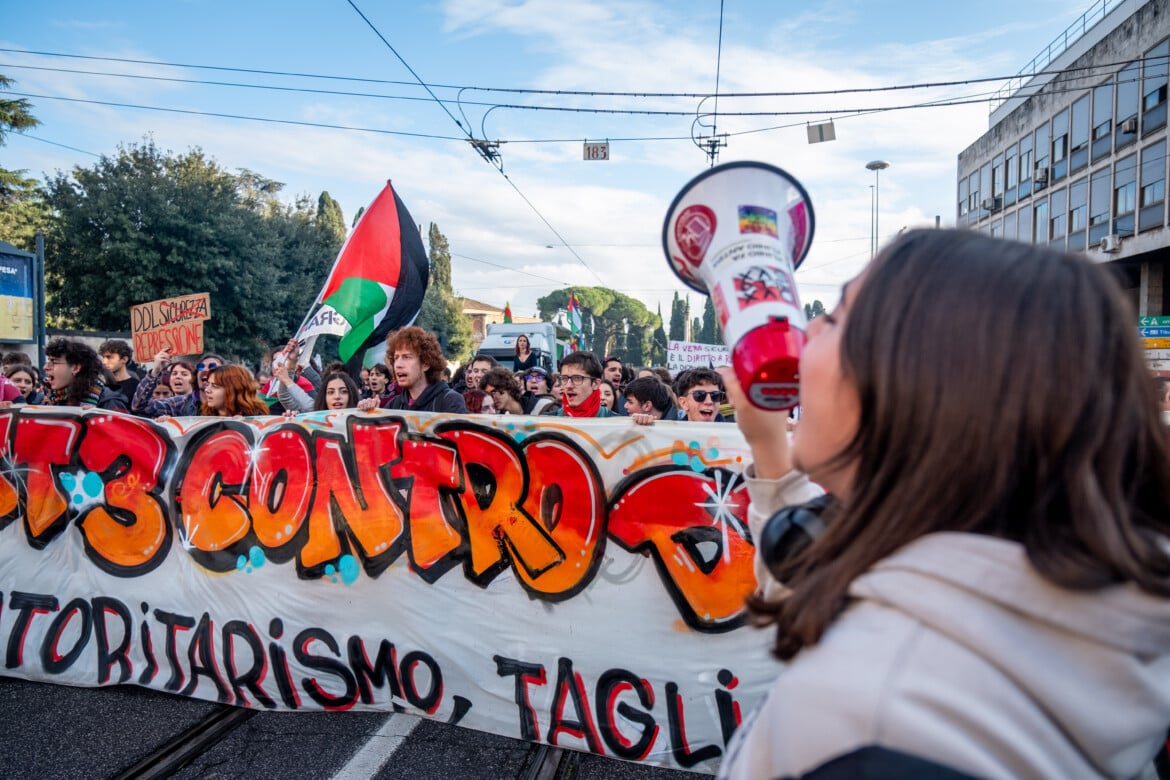Analysis
The resistance against Italy’s Security Bill is not backing down
While the approval of the first articles was relatively quick, now the majority is facing a much more difficult challenge: there are hundreds of amendments submitted by the opposition.

Work on the so-called Security Bill resumed in the Senate on Tuesday. The joint committees on Constitutional Affairs and Justice restart the examination of the text this week, which came to a standstill since December 18 at the step of voting on amendments to Article 14, which criminalizes blocking streets, an article designed ad hoc to target environmental activists and striking workers who picket in front of factories and workplaces.
While the approval of the first articles was relatively quick, now the majority is facing a much more difficult challenge: there are hundreds of amendments submitted by the opposition, and the provisions to be examined are the most critical ones.
Meloni and co. had hoped to get to a floor vote as early as December, but the gears have jammed at several points, amid concerns coming from the president’s office and the Council of Europe, civil society demonstrations and parliamentary obstructionism. The date for the floor vote was first pushed to the end of January, and now to at least March.
The restart of the parliamentary process is also accompanied by the revival of opposition to the bill. The national network “A pieno regime,” which brought one hundred thousand people to Rome's Piazza del Popolo on December 14, convened a two-day event in the capital on Saturday and Sunday at the ARCI national headquarters to organize the mobilization. On Saturday there was a panel discussion to analyze the critical issues in the text of the bill, but also its profound significance in the context of the global changes that right-wingers around the planet are imposing on political systems, with speeches by, among others, Gaetano Azzariti, Silvia Albano, Alessandra Algostino and Patrizio Gonnella, also joined in the debate by the activists who filled Piazza del Popolo in Rome on December 14 to protest the bill.
Sunday was reserved for a national meeting of the network’s activists to discuss the next steps on the agenda. Two such steps are set to take place in the short term: first, on January 17, Amnesty will organize torchlight processions across the country, in front of Palazzo Madama in Rome and in front of the prefectures in other cities. Then, in early February, from the 3rd to the 5th, the activists will fly to Brussels to take the fight against the securitarian program to the heart of the Union, with a press conference with the left-wing groups in the European Parliament.
Meanwhile, preparations continue for another large demonstration to surround the Senate on the day of the vote. The delay of the bill has been the first achievement of the network and the opposition forces in Parliament, whose ultimate goal is the most ambitious: to get the bill withdrawn altogether.
This bill is more than just a right-wing crackdown aimed at the repression of dissent. As Gaetano Azzariti, president of Salviamo la Costituzione (“Save the Constitution”), pointed out on Saturday during the roundtable discussion, the bill is “a manifesto, the idea of democracy that reflects an authoritarian mentality, which is the result of the thinning out of the pluralist democratic dimension.”
It is the culmination of two years of “Melonian laws” that began with the anti-rave decree just after the government was sworn in and reached the stage of the “red zones” in cities introduced a few days ago: the fourth leg of the Hungarian-style counter-reform that the government is enacting in Italy, together with enhanced powers for the prime minister, the separation of careers of judges and prosecutors and differentiated autonomy between regions.
Alessandra Algostino of the No TAV counter-observatory called the law “subversive to democracy,” a showcase of “the deadly embrace between authoritarianism and capitalism, whose bond is vividly enacted by Musk. They want to hit all three prongs: the poor, migrants and dissenters.”
The current pressure on the judiciary was highlighted by Silvia Albano, president of Magistratura Democratica, who has been under enhanced protection by the authorities since November 2 for threats received after ruling to reject the detentions of migrants transferred to Albania.
“There is a large cohort of new young magistrates, because we are understaffed. When I see them, they’re afraid: they are afraid of being given ultimatums, of not having independence,” she said. The battle is set to intensify before the bill is passed. Changes are rumored, on the restrictions against selling SIM cards to migrants and on children in prison.
According to Patrizio Gonnella of Antigone, even if the bill passes, that will only start the phase of appeals and court rulings which could dismantle the law piece by piece.
Originally published at https://ilmanifesto.it/non-si-ferma-la-resistenza-contro-il-ddl-sicurezza on 2025-01-12
